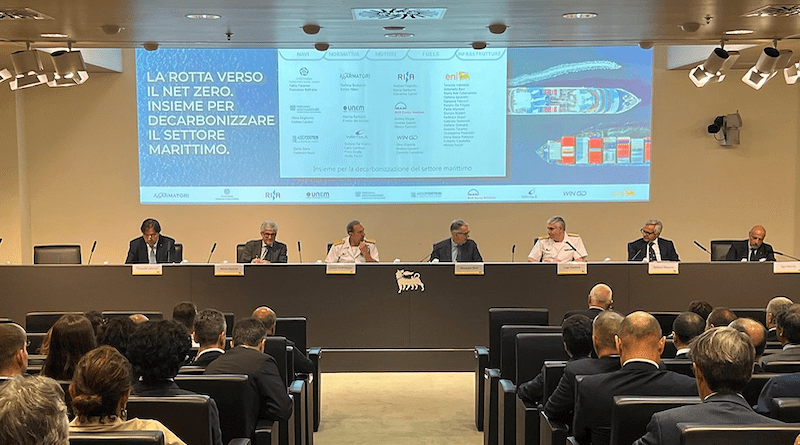Shipowners’ Associations And Eni Join Forces To Decarbonize Maritime Sector
Eni presented Tuesday a document titled “The route to net zero. Decarbonizing the maritime sector” in collaboration with Assarmatori and Confitarma as well as three of the largest companies in the maritime sector (Wärtsilä, WinGD and MAN Energy Solutions) and Unem, Federchimica/Assogasliquidi, Assocostieri and RINA. The contributors oversaw the work of 40 experts who have been working together since last March to achieve a common strategy.
The result was the drafting of a strategic orientation document, beginning with an analysis of the technological evolution of engines and the availability, in terms of infrastructure, of low-carbon energy sources.
More than 100,000 merchant ships transport 12 billion tonnes of goods per year around the world. Today, the maritime sector is the backbone of the global economy: 90% of goods are transported by sea and it is estimated that the sector accounts for about 3% of all global greenhouse gas emissions. At an EU level, maritime transport carries about 75% of extra-EU trade and 36% of intra-EU trade.
The sector needs short, medium and long-term solutions compatible with economic trends in order to gradually reach zero CO2 emissions and enable shipowners to adequately meet the targets set by the EU Commission as well as those laid out at an international level by the International Maritime Organisation (IMO) and any additional region-specific commitments. There are several available energy sources (HVO, FAME, LPG, LNG, methanol, ammonia, synthetic fuels and hydrogen); each has different applications which are determined by the availability of raw materials and the existing or planned infrastructure to produce them.
In the short to medium term, biofuels are an available solution: at today’s meeting, the willingness emerged to carry out pilot cases, which would make it possible to meet EU targets and ensure competitiveness, considering the fact that vessel age is just under 22 years, though this varies depending on the type of activity the vessel carries out.
Engine makers are ready to develop tailor-made solutions for different types of fuel. At the moment, for new orders shipowners are experimenting with single-fuel engines (trialling also with on-board CO2 capture for LNG or technologies that capture carbon in solid form before combustion) and dual-fuel engines (using liquid or gaseous fuels including biofuels, methanol and in the long-term ammonia and hydrogen).
Mario Mattioli, President of Confitarma, and Stefano Messina, President of Assarmatori, said: “Working together on this project with Eni and several other qualified players is further proof that shipowners are at the forefront of the decarbonization of maritime transport and that they are ready to do everything in their power to progress this goal. However, it should be emphasised that when it comes to alternative fuels, the contribution of onshore industry is essential to develop fuels, produce and store them and finally distribute to vessels. We have high expectations in this regard in order to comply with strict national, EU and international regulations on environmental sustainability”.
Giuseppe Ricci, Chief Operating Officer for Energy Evolution at Eni, said: “The maritime sector is crucial for Italy’s competitiveness and also for experimenting with technology that enables carbon neutrality by adopting solutions that further our goal to enable a just transition, according to three dimensions: environment, economy and society. At Eni, we strongly believe in this project, which is an inclusive example of collaboration between all players in the sector, and for us a first step both to promote mature solutions like biofuels and to test longer-term solutions”.

